Iran
Iran: Text Of Ahmadinejad's Letter To Bush
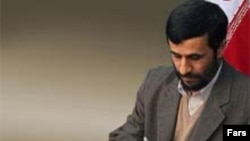
(Fars) On May 8, the Iranian government announced that President Mahmud Ahmadinejad had sent a letter to U.S. President George W. Bush. The letter was the first direct communication between leaders of the two countries since Iran's 1979 Islamic Revolution. Below, RFE/RL presents the English version of Ahmadinejad's letter that was posted on the Iranian president's website. It has been edited for grammar and style, but is presented in its entirety.
Mr. George Bush,
President of the United States of America
For some time now I have been thinking, how one can justify the undeniable contradictions that exist in the international arena and which are being constantly debated, especially in political forums and among university students. Many questions remain unanswered. These have prompted me to discuss some of the contradictions and questions, in the hopes that it might bring about an opportunity to redress them.
Can one be a follower of Jesus Christ (peace be upon Him), the great Messenger of God, feel obliged to respect human rights, present liberalism as a civilization model, announce one's opposition to the proliferation of nuclear weapons and [other] weapons of mass destruction [WMD], make "War [on] Terror" his slogan, and, finally, work toward the establishment of a unified international community -- a community which Christ and the virtuous of the Earth will one day govern, but, at the same time, have countries attacked; have the lives, reputations, and possessions of people destroyed; and on the slight chance [that there are] criminals in a village, city, or convoy, for example, set ablaze the entire village, city, or convoy?
The War In Iraq
Or because of the possibility of the existence of WMDs in one country, it is occupied, around 100,000 people are killed, its water resources, agriculture, and industry destroyed, close to 180,000 foreign troops are put on the ground, the sanctity of private homes is violated, and the country pushed back perhaps 50 years. At what price? Hundreds of billions of dollars are spent from the treasury of one country and certain other countries; tens of thousands of young men and women -- as occupation troops -- are put in harm's way, taken away from their family and loved ones; their hands are stained with the blood of others; they are subjected to so much psychological pressure that every day some commit suicide and those returning home suffer depression, become sickly, and grapple with all sorts of aliments; and some are killed and their bodies handed to their families.
On the pretext of the existence of WMDs, this great tragedy came to engulf both the peoples of the occupied and the occupying country. Later it was revealed that no WMDs existed to begin with. Of course [former Iraqi President] Saddam [Hussein] was a murderous dictator. But the war was not waged to topple him. The announced goal of the war was to find and destroy weapons of mass destruction. He was toppled along the way toward another goal. Nevertheless, the people of the region are happy about it. I point out that throughout the many years of the war on Iran, Saddam was supported by the West.
Mr. President, you might know that I am a teacher. My students ask me how can theses actions be reconciled with the values outlined at the beginning of this letter, with one's duty to the tradition of Jesus Christ (PBUH), the Messenger of peace and forgiveness.
You are familiar with history. Aside from the Middle Ages, at what other point in history has scientific and technical progress been a crime? Can the possibility of scientific achievements being utilized for military purposes be reason enough to oppose science and technology altogether? If such a supposition is true, then all scientific disciplines, including physics, chemistry, mathematics, medicine, engineering, etc., must be opposed.
There are prisoners at Guantanamo Bay who have not been tried, have no legal representation. Their families cannot see them and they are obviously kept in a strange land outside their own country. There is no international monitoring of their conditions and fate. No one knows whether they are prisoners, prisoners of war, accused, or criminals.
European investigators have confirmed the existence of secret prisons in Europe too. I could not correlate the abductions of people and their detention in secret prisons with the provisions of any judicial system. For that matter, I fail to understand how such actions correspond to the values outlined in the beginning of this letter, i.e., the teachings of Jesus Christ (PBUH), human rights, and liberal values.
Israel And The Holocaust
Young people, university students, and ordinary people have many questions about the phenomenon of Israel. I am sure you are familiar with some of them.
Throughout history many countries have been occupied, but I think the establishment of a new country with a new people, is a new phenomenon that is exclusive to our times.
Students are saying that 60 years ago such a country did not exist. They show old documents and globes and say, "Try as we might, we have not been able to find a country named Israel." I tell them to study the history of World War I and World War II. One of my students told me that during World War II, in which many tens of millions of people perished, news about the war, was quickly disseminated by the warring parties. Each touted their victories and the most recent battlefront defeat of the other party.
After the war, they claimed that 6 million Jews had been killed. Six million people that were surely related to at least 2 million families. Again, let us assume that these events are true. Does that logically translate into the establishment of the state of Israel in the Middle East or support for such a state? How can this phenomenon be rationalized or explained?
Mr. President, I am sure you know how -- and at what cost -- Israel was established: Many thousands were killed in the process; millions of indigenous people were made refugees; hundred of thousands of hectares of farmland, olive plantations, towns, and villages were destroyed.
This tragedy is not exclusive to the time of establishment; unfortunately it has been ongoing for 60 years now. A regime has been established that does not show mercy even to children, that destroys houses while the occupants are still in them, that announces beforehand its list and plans to assassinate Palestinian figures and keeps thousands of Palestinians in prison. Such a phenomenon is unique -- or at the very least extremely rare -- in recent memory.
Another big question asked by people is, why is this regime being supported? Is support for this regime in line with the teachings of Jesus Christ (PBUH) or Moses (PBUH) or liberal values? Or are we to understand that allowing the original inhabitants of these lands -- inside and outside Palestine -- whether they are Christian, Muslim, or Jewish, to determine their own fate runs contrary to principles of democracy, human rights, and the teachings of the prophets? If not, why is there so much opposition to a referendum?
The Palestinian Election
The newly elected Palestinian administration recently took office. All independent observers have confirmed that this government represents the electorate. Unbelievingly, they have put the elected government under pressure and have advised it to recognize the Israeli regime, abandon the struggle and follow the programs of the previous government.
If the current Palestinian government had run on the above platform, would the Palestinian people have voted for it? Again, can such position taken in opposition to the Palestinian government be reconciled with the values outlined earlier? The people are also saying, "Why are all UN Security Council resolutions in condemnation of Israel vetoed?"
Mr. President, as you are well aware, I live among the people and am in constant contact with them. Many people from around the Middle East manage to contact me as well. They do not have faith in these dubious policies either. There is evidence that the people of the region are becoming increasingly angry with such policies.
It is not my intention to pose to many questions, but I need to refer to other points as well.
'Scientific Research And Development'
Why is it that any technological and scientific achievement reached in the Middle East regions is translated into and portrayed as a threat to the Zionist regime? Is not scientific research and development one of the basic rights of nations?
You are familiar with history. Aside from the Middle Ages, at what other point in history has scientific and technical progress been a crime? Can the possibility of scientific achievements being utilized for military purposes be reason enough to oppose science and technology altogether? If such a supposition is true, then all scientific disciplines, including physics, chemistry, mathematics, medicine, engineering, etc., must be opposed.
Lies were told in the Iraqi matter. What was the result? I have no doubt that telling lies is reprehensible in any culture, and you do not like to be lied to.
The Third World
Mr. President, don't Latin Americans have the right to ask why their elected governments are being opposed and coup leaders supported? Or, why must they constantly be threatened and live in fear?
The people of Africa are hardworking, creative, and talented. They can play an important and valuable role in providing for the needs of humanity and can contribute to its material and spiritual progress. Poverty and hardship in large parts of Africa are preventing this from happening. Don't they have the right to ask why their enormous wealth -- including minerals -- is being looted, despite the fact that they need it more than others?
Again, do such actions correspond to the teachings of Christ and the tenets of human rights?
The brave and faithful people of Iran too have many questions and grievances, including: the coup d'etat of 1953 and the subsequent toppling of the legal government of the day; opposition to the Islamic Revolution, transformation of an embassy into a headquarters supporting the activities of those opposing the Islamic republic (many thousands of pages of documents corroborates this claim); support for Saddam in the war waged against Iran; the [July 1988] shooting down of an Iranian passenger plane; the freezing of the assets of the Iranian nation; increasing threats, anger, and displeasure regarding the scientific and nuclear progress of the Iranian nation (just when all Iranians are jubilant and collaborating their country's progress); and many other grievances that I will not refer to in this letter.
September 11, 2001
Mr. President, September 11[, 2001,] was a horrendous incident. The killing of innocents is deplorable and appalling in any part of the world. Our government immediately declared its disgust with the perpetrators and offered its condolences to the bereaved and expressed its sympathies.
All governments have a duty to protect the lives, property, and good standing of their citizens. Reportedly, your government employs extensive security, protection, and intelligence systems -- and even hunts its opponents abroad. September 11 was not a simple operation. Could it be planned and executed without coordination with intelligence and security services -- or their extensive infiltration? Of course, this is just an educated guess. Why have the various aspects of the attacks been kept secret? Why are we not told who botched their responsibilities? And, why aren't those responsible and the guilty parties identified and put on trial?
All governments have a duty to provide security and peace of mind for their citizens. For some years now, the people of your country and neighbors in world trouble spots do not have peace of mind. After 9/11, instead of healing and tending to the emotional wounds of the survivors and the American people -- who had been immensely traumatized by the attacks -- some Western media only intensified the climate of fear and insecurity. Some constantly talked about the possibility of new terror attacks and kept the people in fear. Is that service to the American people? Is it possible to calculate the damages incurred from fear and panic?
American citizens lived in constant fear of fresh attacks that could come at any moment and at any place. They felt insecure in the streets, in their place of work, and at home. Who would be happy with this situation? Why was the media, instead of conveying a feeling of security and providing peace of mind, giving rise to feelings of insecurity?
The Role Of The Media
Some believe the hype paved the way -- and was the justification -- for an attack on Afghanistan. Again I need to refer to the role of media. In media charters, correct dissemination of information and honest reporting of a story are established tenets. I express my deep regret about the disregard shown by certain Western media for these principles. The main pretext for an attack on Iraq was the existence of WMDs. This was repeated incessantly -- for the public to, finally, believe -- and to set the ground for an attack on Iraq.
Will the truth not be lost in a contrived and deceptive climate? Again, if the truth is allowed to be lost, how can that be reconciled with the earlier-mentioned values? Is the truth known to the Almighty lost as well?
Mr. President, in countries around the world citizens provide for the expenses of governments so that their governments in turn are able to serve them. The question here is, "what has the hundreds of billions of dollars spent every year to pay for the Iraqi campaign produced for [U.S.] citizens?"
As Your Excellency is aware, in some states of your country, people are living in poverty. Many thousands are homeless and unemployment is a huge problem. Of course these problems exist -- to a greater or lesser extent -- in other countries as well. With these conditions in mind, can the gargantuan expenses of the [Iraq] campaign -- paid from the public treasury -- be explained and be consistent with the aforementioned principles?
What has been said [above] are some of the grievances of the people around the world, in our region, and in your country. But my main contention -- and I am hoping you will agree to some of it -- is: those in power have a specific time in office and do not rule indefinitely, but their names will be recorded in history and will be constantly judged in the immediate and distant futures.
What Legacy Will We Leave?
The people will scrutinize our presidencies. Did we manage to bring peace, security, and prosperity to our people or insecurity and unemployment? Did we intend to establish justice, or just support special-interest groups and -- by forcing many people to live in poverty and hardship -- make a few people rich and powerful, -- thus trading the approval of the people and the Almighty for [that of those few]? Did we defend the rights of the underprivileged or ignore them? Did we defend the rights of all people around the world or impose wars on them, interfere illegally in their affairs, and establish hellish prisons and incarcerate some of them? Did we bring the world peace and security or did we raise the specter of intimidation and threats? Did we tell the truth to our nation and others around the world or present an inverted version of it? Were we on the side of people or the occupiers and oppressors? Did our administration set out to promote rational behavior, logic, ethics, peace, fulfilling obligations, justice, service to the people, prosperity, progress, and respect for human dignity or, rather, the force of arms, intimidation, insecurity, disregard for the people, delaying the progress and excellence of other nations, and the disrespect of [other] people's rights? And finally, they will judge us on whether we remained true to our oath of office -- to serve the people, which is our main task, and the traditions of the prophets.
Mr. President, how much longer can the world tolerate this situation? Where will this trend lead the world? How long must the people of the world pay for the incorrect decisions of some rulers? How much longer will the specter of insecurity -- raised from the stockpiles of weapons of mass destruction -- haunt the people of the world? How much longer will the blood of the innocent men, women, and children be spilled on the streets and people's houses destroyed over their heads? Are you pleased with the current condition of the world? Do you think present policies can continue? If billions of dollars spent on security, military campaigns, and troop movement were instead spent on investment and assistance for poor countries, promotion of health, combating different diseases, education, the improvement of mental and physical fitness, assistance to the victims of natural disasters, creation of employment opportunities and production, development projects and poverty alleviation, establishment of peace, mediation between disputing states and extinguishing the flames of racial, ethnic, and other conflicts -- were would the world be today? Would not your government and people be justifiably proud? Would not your administration's political and economic standing have been stronger? And, I am most sorry to say, would there have been this ever-increasing global hatred of the American governments?
Mr. President, it is not my intention to distress anyone. If the prophets Abraham, Isaac, Jacob, Ishmael, Joseph, or Jesus Christ (PBUH) were with us today, how would they judge such behavior? Will we be given a role to play in the promised world, where justice will become universal and Jesus Christ (PBUH) will be present? Will they even accept us?
Monotheism
My basic question is this: Is there no better way to interact with the rest of the world?
Today there are hundreds of millions of Christians, hundreds of millions of Muslims, and millions of
people who follow the teachings of Moses (PBUH). All divine religions share and respect one word and that is "monotheism" or the belief in a single God and no other in the world.
The Holy Koran stresses this common word and calls on all followers of divine religions and says: "Say, O followers of the Book! Come to an equitable proposition between us and you that we shall not serve any but Allah and [that] we shall not associate aught with Him and [that] some of us shall not take others for lords besides Allah, but if they turn back, then say: 'Bear witness that we are Muslims.'"
Mr. President, according to the divine verses, we have all been called upon to worship one God and follow the teachings of the divine prophets -- "to worship a God which is above all powers in the world and can do all He pleases." "The Lord, which knows that which is hidden and visible, the past and the future, knows what goes on in the hearts of His servants and records their deeds." "The Lord who is the possessor of the heavens and the earth and all universe is in His court." "Planning for the universe is done by His hands, and gives His servants the glad tidings of mercy and forgiveness of sins." "He is the companion of the oppressed and the enemy of oppressors". "He is the compassionate, the merciful." "He is the recourse of the faithful and guides them toward the light from darkness." "He is witness to the actions of His servants." "He calls on servants to be faithful and do good deeds, and asks them to stay on the path of righteousness and remain steadfast." "He calls on servants to heed His prophets and He is a witness to their deeds." "A bad ending belongs only to those who have chosen the life of this world and disobey Him and oppress His servants." "A good and eternal paradise belongs to those servants who fear His majesty and do not follow their lascivious selves."
We believe a return to the teachings of the divine prophets is the only road leading to salvation. I have been told that Your Excellency follows the teachings of Jesus (PBUH) and believes in the divine promise of the rule of the righteous on Earth. We also believe that Jesus Christ (PBUH) was one of the great prophets of the Almighty. He has been repeatedly praised in the Koran. Jesus (PBUH) has been quoted in Koran as well: "And surely Allah is my Lord and your Lord, therefore serve Him; this is the right path, Marium."
Service and obedience to the Almighty is the credo of all divine messengers.
The God of all people in Europe, Asia, Africa, America, the Pacific, and the rest of the world is one. He is the Almighty who wants to guide and give dignity to all His servants. He has given greatness to humans.
We again read in the Holy Book: "The Almighty God sent His prophets with miracles and clear signs to guide the people and show them divine signs and purity them from sins and pollution. And He sent the Book and the balance so that the people [might] display justice and avoid the rebellious."
All of the above verses can be seen, one way or another, in the Bible as well.
Judgment Day
Divine prophets have promised that the day will come when all humans will congregate before the court of the Almighty so that their deeds might be examined. The good will be directed toward Heaven and evildoers will meet divine retribution. I trust both of us believe in such a day, but it will not be easy to calculate the actions of rulers, because we must be answerable to our nations and all others whose lives have been directly or indirectly affected by our actions.
Afghan refugees in November 2001, shortly after the beginning of the U.S.-led campaign to oust the Taliban regime (bymedia)
Mr. President, history tells us that repressive and cruel governments do not survive. God has entrusted the fate of man to them. The Almighty has not left the universe and humanity to their own devices. Many things have happened contrary to the wishes and plans of governments. These tell us that there is a higher power at work and all events are determined by Him.
Can one deny the signs of change in the world today? Is this situation of the world today comparable to that of 10 years ago? Changes happen fast and come at a furious pace. The people of the world are not happy with the status quo and pay little heed to the promises and comments of a number of influential world leaders. Many people around the world feel insecure and oppose the spread of insecurity and war and do not approve of or accept dubious policies. The people are protesting the increasing gap between the haves and the have-nots and the rich and poor countries. The people are disgusted with increasing corruption. The people of many countries are angry about the attacks on their cultural foundations and the disintegration of families. They are equally dismayed with the fading of care and compassion.
World Turning To Religion
The people of the world have no faith in international organizations because their rights are not advocated by these organizations. Liberalism and Western-style democracy have not been able to help realize the ideals of humanity. Today these two concepts have failed. Those with insight can already hear the sounds of the shattering and fall of the ideology and thoughts of the liberal democratic systems.
Iranians burn an Israeli flag during a protest in front of the German Embassy in Tehran on February 14 (epa)
Mr. President, whether we like it or not, the world is gravitating toward faith in the Almighty and justice and the will of God will prevail over all things.
Peace to him who follows the rightfully guided,
Mahmud Ahmadinejad
President of the Islamic Republic of Iran
What The Street Thinks
 A demonstration in support of Iran's nuclear program outside the Isfahan uranium-conversion facility in Isfahan in January (epa)
A demonstration in support of Iran's nuclear program outside the Isfahan uranium-conversion facility in Isfahan in January (epa)
IRANIANS SPEAK OUT ON THE DISPUTE: To find out more about what Iranians think about the international controversy over their country's nuclear program, RADIO FARDA asked listeners to express their views....(more)
See also:
Iran: Public Has Mixed Feelings On Nuclear Issue

THE COMPLETE PICTURE: RFE/RL's complete coverage of controversy surrounding Iran's nuclear program.
CHRONOLOGY
An annotated timeline of Iran's nuclear program.More News
- By RFE/RL
Trump Warns Iran Of 'Great Danger' If Weekend Nuclear Talks Fail
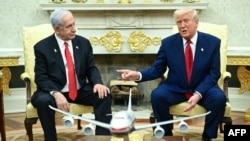
US President Donald Trump said the United States will hold high-level "direct" talks with Iran at a "very big meeting" this week while warning Tehran it would be in “great danger” if the talks on its nuclear program don’t succeed.
Iran's foreign minister confirmed that a meeting was set to take place on April 12, but the talks would be "indirect."
"Iran and the United States will meet in Oman on Saturday for indirect high-level talks," Iranian Foreign Minister Abbas Araghchi said on X on April 7 shortly after Trump commented on the talks.
"It is as much an opportunity as it is a test. The ball is in America's court."
Iran has insisted on indirect negotiations, saying it would not hold direct talks as long as Trump's "maximum pressure" campaign on Tehran is in effect.
Araghchi later told Iran's semiofficial Tasnim news agency that US envoy to the Middle East Steve Witkoff would be at the talks, but the two would speak only through a mediator.
Trump told reporters at the White House that talks were taking place "on a very high level, almost the highest level," and emphasized that no intermediaries were involved.
He did not say who would represent the United States. Witkoff has not commented publicly on whether he would attend the talks.
"We have a very big meeting, and we'll see what can happen. I think everybody agrees that doing a deal would be preferable," Trump said in an impromptu press conference with Israeli Prime Minister Benjamin Netanyahu.
"If talks with Iran aren't successful, I think Iran will be in great danger," Trump said, insisting that the Islamic republic must not be allowed to develop a nuclear weapon.
Netanyahu briefly weighed in, expressing support for a Libya-style deal with Iran --a reference to a 2003 agreement in which the African nation agreed to dismantle its weapons of mass destruction programs.
Iran maintains its nuclear program is for civilian purposes and has previously rejected the possibility of a Libya-style agreement.
Trump earlier this month called for "direct talks" with Tehran, saying they were "faster" and offered a better understanding than using intermediaries. Trump suggested then that a new agreement with Iran could be "different and maybe a lot stronger" than the 2015 nuclear deal.
He had previously sent a letter to Supreme Leader Ayatollah Ali Khamenei calling for negotiations and warning of military action if diplomacy failed.
Iranian President Masud Pezeshkian on April 5 said that Tehran was willing to engage in dialogue on an "equal footing." The following day Araghchi said in a statement that Tehran was prepared to hold indirect talks.
After abrogating the nuclear deal in 2018 during his first term as president, Trump reimposed sanctions on Iran that had been lifted under the agreement. Iran retaliated by accelerating its nuclear program and is currently enriching uranium at 60 percent purity, which is described as near weapons-grade.
The 2015 deal, formally known as the Joint Comprehensive Plan of Action (JCPOA), has a snapback mechanism that allows for the return of UN sanctions on Iran. But once the deal expires in October, world powers lose the ability to trigger the mechanism.
Trump has threatened to bomb Iran if there is no agreement on Tehran's nuclear program. Iran has warned that it will deliver a "strong" response to any aggression and has suggested that it will develop a bomb if attacked.
Washington has been sending mixed messages about whether it wants to restrict Iran's uranium enrichment or fully dismantle Tehran's nuclear program.
Iran has not commented on Trump's assertion that direct talks have already started.
Nour News, a website affiliated with Ali Shamkhani, a senior adviser to Iran's supreme leader, described Trump's remarks as "a calculated effort to shape public opinion" aimed at portraying Washington as the party taking diplomatic initiative and Tehran as the side opposed to dialogue.
- By RFE/RL
Iran Rejects Trump Call For Direct Talks Over Nuclear Program
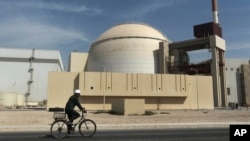
Iran's foreign minister rejected US proposals for direct negotiations over Tehran’s nuclear ambitions, days after US President Donald Trump called for face-to-face talks.
In a statement released on April 6 by the Foreign Ministry, Abbas Araghchi said Tehran was prepared to hold indirect talks with Washington.
"Iran keeps itself prepared for all possible or probable events, and just as it is serious in diplomacy and negotiations, it will also be decisive and serious in defending its national interests and sovereignty," he was quoted saying.
Araghchi's comments came three days after Trump called for "direct talks" with Tehran, saying they were "faster" and offered a better understanding than using intermediaries.
Last month, Trump sent a letter to Supreme Leader Ayatollah Ali Khamenei calling for negotiations and warning of military action if diplomacy failed.
Iranian President Masud Pezeshkian, meanwhile, said on April 5 that Tehran was willing to engage in dialogue on an "equal footing."
In 2015, Iran reached a landmark deal with United States, France, China, Russia, and Britain, as well as Germany, to curtail its nuclear activities.
The 2015 agreement -- known as the Joint Comprehensive Plan of Action -- eased punishing sanctions that had restricted Iran's economy.
During Trump's first term in office, however, the United States withdrew from the agreement and reinstated punitive sanctions.
Iran rejects Western allegation that it is seeking to build nuclear weapons, insisting its programs are only aimed at civilian purposes like electricity generation.
With reporting by AFP
- By RFE/RL
Iranian Currency's Value Tumbles To Record Low As US 'Maximum Pressure' Bites
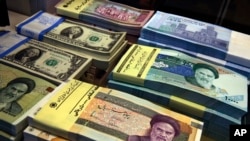
Iran's national currency, the rial, tumbled to a record low against the US dollar, as US President Donald Trump's "maximum pressure" strategy against the Islamic republic's economy continued to take its toll.
As of April 5, a dollar cost more than 1 million rials on exchange markets, as currency shops reopened for the day following closings for the Persian New Year, Nowruz.
AP reported that on Ferdowsi Street in Tehran, the heart of Iran's currency markets, some traders had turned off their shops' electronic signs displaying current rates as anticipation grew that the rial would likely drop further.
"We turned it off since we are not sure about the successive changes of the rate," Reza Sharifi, a worker at one exchange, told AP.
Trump has reinstated the "maximum pressure" campaign against Iran's economy that he initiated during his first term as Washington seeks to pressure Tehran to negotiate over its nuclear program.
Tehran claims its nuclear sector is intended solely for civilian purposes, while the United States accuses Iran of attempting to develop nuclear weapons.
"The maximum pressure campaign devastated Iran's economy and denied it critical resources. A nuclear Iran is not an option," US lawmaker Mike Lawler (Republican-New York) said on April 1.
Democratic lawmakers have also acknowledged the threat posed by Iran but stressed the importance of diplomacy.Trump in 2018 withdrew the United States from the 2015 Iran nuclear deal signed with world powers and reinstated sanctions that had been lifted in return for restrictions on Tehran's nuclear program.
When the deal went into effect, the rial traded at 32,000 to the dollar.
Trump has threatened to bomb Iran if it fails to reach a deal with Washington. Tehran has dismissed the threat, describing it as an "affront" to peace and security.
Iran in late March delivered a formal response to a letter sent by Trump letter proposing direct talks to reach a new nuclear deal.
Iran has dismissed direct negotiations as long as the "maximum pressure" campaign is in effect, but conflicting remarks out of Tehran have led some experts to speculate that such talks could resume.
Public outrage is mounting in Iran as the country's struggling economy worsens under the crippling US sanctions, placing pressure on reformist President Masud Pezeshkian, who was elected in 2024, an outcome that raised hopes of better relations with the West.
"This [the economic downturn] will make the prospects of change in the [Iran] impossible in the eyes of the people…. An angry and hungry society can take to the streets at any moment," Saeed Peyvandi, a professor of sociology at Paris 13 University, told RFE/RL's Radio Farda in February.
A pensioner who gave only his first name, Saeed, because of fears of reprisal, told AP that if Iran ceased its hostile policy toward the outside world, financial relief could be possible.
"If we want to live a comfortable life, we should maintain good ties with our neighbors. We shouldn't bare our teeth at them. They will do the same," he said.
With reporting by RFE/RL's Radio Farda and AP
- By RFE/RL
Netanyahu Traveling To US To Meet Trump, Discuss Iran, Tariffs
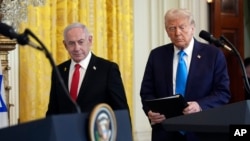
Israeli Prime Minister Benjamin Netanyahu will travel to the United States on April 6 to meet with President Donald Trump for discussions on Iran and new US trade tariffs, the Israeli leader's office said.
"The two leaders will discuss tariffs, efforts to bring back Israeli hostages (from Gaza), Israel-Turkey relations, the Iranian threat, and the fight against the International Criminal Court," Netanyahu's office said, referring to The Hague-based court that has accused him of war crimes and crimes against humanity.
Both Trump and Netanyahu have rejected the ICC allegations as "baseless."
The White House did not immediately comment on Nethanyahu's upcoming visit.
US media had quoted four Israeli officials and a White House official earlier in the day as saying Netanyahu was expected to visit the White House on April 7.
The right-wing Israeli leader is considered a close ally to Trump. Along with the ICC accusations, Netanyahu has come under international criticism for the conduct of the war in the Gaza Strip.
Trump, other US officials, and Netanyahu have defended Israeli military actions in the territory, which came after a deadly incursion into Israel by the Hamas movement, which is considered a terrorist organization by the United States and European Union.
The trip will mark the second official visit to Washington by Netanyahu since Trump took office on January 20. He held meetings with the US leader in early February, making him the first foreign visitor to the White House during Trump's second term in office.
After that visit, Trump signed an order on February 4 to restore his "maximum pressure" policy on Iran aimed at hurting its oil exports and slowing its nuclear program.
US sanctions on Iran's energy sector have been in place since 2018, when Trump during his first term withdrew from the 2015 nuclear deal and reimposed sanctions that had been lifted under its terms. Iranian oil sales plummeted as a result.
Also during Netanyahu's visit, Trump announced a controversial proposal calling for the United States to take over control of the Gaza Strip and economically develop the war-torn Palestinian coastal area. Under the plan, the Palestinian civilian population was to be relocated to other countries in the region.
Israel, like most other nations, is facing a rise in tariffs under Trump's newly announced trade policy. The tariff rate against Israeli products is 17 percent, and Netanyahu will likely seek to strike a new agreement with the US leader.
Netanyahu's visit comes following of a day of protest on April 5 against Trump's policies throughout the United States. Demonstrations were held at some 1,200 sites in all 50 states, organized by more than 150 groups. The rallies appeared to go off peacefully, with one of the main organizers saying about 600,000 people took part.
With reporting by AFP and Reuters
- By Kian Sharifi
Military Confrontation 'Almost Inevitable' In Absence Of Iran Deal
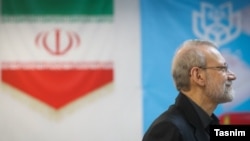
Welcome back to The Farda Briefing, an RFE/RL newsletter that tracks the key issues in Iran and explains why they matter.
I'm RFE/RL correspondent Kian Sharifi. In this edition I'm looking at how Iran's threats to go nuclear and its insistence on indirect talks with the United States are frustrating the West, with France warning military action is becoming "inevitable."
What You Need To Know
• Doubling Down On Nuclear Threats: Ali Larijani, a senior aide to Iran's supreme leader, has warned that military action against the Islamic republic would push Tehran to develop nuclear weapons. Meanwhile, France has raised the alarm over Iran's nuclear program, warning that if there is no deal by October military confrontation would be "almost inevitable."
• Alleged Bank Hacking Fuels Outrage: Iran's Sepah Bank was allegedly hacked by the Codebreakers group last week, exposing the data of 42 million customers, including high-profile accounts. Sepah Bank has denied any breach, insisting its systems are secure and "unhackable." The breach has fueled online outrage over economic inequality and Iran's cybersecurity weaknesses. The alleged compromised data includes information related to members of the Islamic Revolutionary Guards Corps (IRGC).
• Sociologist Faces Backlash After Criticizing Khamenei: Iranian sociologist Mostafa Mehraeen sparked controversy after publishing two open letters criticizing Supreme Leader Ayatollah Ali Khamenei. In the first, he urged Khamenei to acknowledge mistakes, apologize, and step down, leading to legal action and a court summons. In his second letter, he questioned Khamenei's belief in his divine mission. In an interview with RFE/RL's Radio Farda, he praised the "strength" of Iranian society, crediting it for giving him the "courage" to address Khamenei.
The Big Issue
Friends Or Enemies -- Pick One
Larijani, a senior adviser to Khamenei, said on April 1 that the United States could either approach Iran as an economic partner or treat it as the enemy.
"They can talk about economic benefits and have fair cooperation with Iran on economic issues that benefit both," he said in a televised interview.
But Larijani, a former parliament speaker and ex-national security adviser, added that military threats against Iran would only make matters worse.
"If America or Israel attacks Iran under the pretense of nuclear issues, Iran might move toward making an atomic bomb," he said.
Why It Matters: US President Donald Trump has threatened to bomb Iran if there is no agreement on Tehran's nuclear program.
The 2015 nuclear deal, which Trump withdrew from in 2018, is set to expire in October. Once the deal expires, world powers will not be able to reimpose UN sanctions on Iran.
Acknowledging that, French Foreign Minister Jean-Noel Barrot on April 2 warned in parliament that in the absence of a new deal, "a military confrontation would appear to be almost inevitable."
Iran has rejected Trump's proposal for direct negotiations, saying it will only agree to indirect talks unless the US president drops his "maximum pressure" campaign. However, Trump claimed on April 3 that he thinks Iran has reconsidered its stance.
Barrot said "our priority" is to reach an agreement that "verifiably and durably constrains" Iran's nuclear program.
But contradictory messages have been coming from the United States, with Special Envoy to the Middle East Steve Witkoff calling for the "full dismantlement" of the program.
Fabian Hinz, a researcher at the International Institute for Strategic Studies, said recent military drills and the unveiling of missile bases suggest Tehran believes military threats are credible. The United States beefing up its presence in the Middle East has certainly contributed.
He told RFE/RL's Radio Farda that a military strike would only "buy time" rather than destroy Iran's nuclear capability, since "knowledge can't be bombed."
Hinz argued that if Iran's nuclear program is attacked it would likely continue covertly. He added that identifying and targeting supply chains in Iran could "disrupt the program really heavily."
What's Being Said: Larijani's comments, particularly on the potential to develop a bomb, has caused a flurry of reactions inside Iran.
Reformist analyst Ahmad Zeidabadi said the Islamic republic "only makes matter more difficult for itself and easier for America and Israel" when officials keep touting Iran's military strength and the ability to weaponize the nuclear program.
Culture Minister Abbas Salehi rejected the possibility of Iran going nuclear, insisting Khamenei's fatwa against developing a nuclear weapon would not change based on current affairs because it was rooted in "religious principles."
Expert Opinion: "From an Iranian perspective, it would make sense to take all of Trump very seriously, because he killed one of the highest-ranking members of the regime," said Hinz, referring to the 2020 killing of IRGC Quds Force general Qassem Soleimani.
That's all from me for now.
Until next time,
Kian Sharifi
If you enjoyed this briefing and don't want to miss the next edition, subscribe here . It will be sent to your inbox every Friday.
- By RFE/RL
US House Panel Backs Tougher Iran Measures, But Divisions Persist
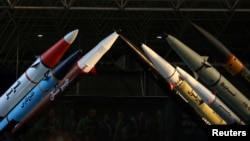
US lawmakers and experts at a House Foreign Affairs Committee hearing underscored a rare bipartisan consensus -- preventing Iran from acquiring nuclear weapons as a top priority.
However, divisions remain over how far Washington should go in applying pressure versus pursuing diplomacy.
Republican lawmakers strongly supported the Donald Trump administration’s decision to reinstate the “maximum pressure” campaign that defined his Iran policy during his first term as US president.
“The maximum pressure campaign devastated Iran’s economy and denied it critical resources. A nuclear Iran is not an option,” Subcommittee Chairman Mike Lawler (Republican-New York) said on April 1.
Democratic lawmakers also acknowledged the threat posed by Iran but stressed the importance of diplomacy.
“There is bipartisan understanding of the danger posed by Iran as the world’s foremost state sponsor of terrorism. We must combine pressure with diplomatic engagement,” Ranking Member Gregory Meeks (Democratic-New York) said.
Three expert witnesses provided testimony on the challenges posed by Iran and the potential consequences of US strategies.
Norman Roule, a senior advisor at the Center for Strategic and International Studies, warned that Iran is advancing its nuclear program and could produce a weapon within months if left unchecked.
“Iran is closer than ever to producing a nuclear weapon,” Roule warned, adding that military strikes could only delay its program. He called for a comprehensive approach that combines sanctions, military readiness, and diplomacy.
Claire Jungman of United Against Nuclear Iran (UANI) highlighted the economic toll that sanctions have taken on the country, noting that its economy remains fragile due to inflation and currency devaluation.
She stressed the importance of targeting Iran’s oil trade with China in violation of US sanctions and leveraging its economic vulnerabilities to weaken its support for regional proxies like the US-designated Lebanese terrorist group Hezbollah.
Dana Stroul of The Washington Institute for Near East Policy noted that military strikes could escalate into broader conflict and urged Washington to pair pressure tactics with robust diplomacy.
She added that “the pillars of Iran’s security strategy”, including its nuclear program, proxy network, and arsenal of missiles and drones, are “more vulnerable today than ever.”
Trump has threatened to bomb Iran if it fails to reach a deal with Washington. Tehran has dismissed the threat, describing it as an “affront” to peace and security.
Iran last week delivered a formal response to Trump’s letter proposing direct talks to reach a new nuclear deal. Tehran has dismissed direct negotiations as long as the “maximum pressure” campaign is in effect.
Axios reports that the White House is “seriously considering” Iran’s proposal for indirect talks while boosting its military presence in the Middle East.
Addressing Iranian Supreme Leader Ayatollah Ali Khamenei, Committee Chairman Brian Mast (Republican-Florida) said Trump “will work with you to peacefully end” Iran’s nuclear and ballistic missile programs.
“Or, President Trump will destroy your nuclear weapons and ballistic missile program. You get to choose the remedy,” he said.
Iran maintains its nuclear program is peaceful, but there are growing calls in Iran to weaponize it as a form of deterrence against the United States and Israel.
Later on April 2, the Trump administration announced sanctions against individuals and companies it claims are helping the Iranian-backed Houthis, a rebel group designated as a terrorist organization by the United States.
The Houthis, formally known as the Ansarallah movement, seized power in Yemen in 2014 by toppling the internationally recognized, Saudi-backed government. The Trump administration last month launched strikes against Houthis rebels, who have been target shipping in the Red Sea, a crucial transportation corridor.
The Trump administration sanctioned two Russia-based Afghan brothers who assisted an Iran-based financier l in orchestrating shipments of stolen Ukrainian grain from Crimea to Yemen.
It also blocked eight digital asset wallets used by the Houthis to transfer funds associated with the group’s activities.
- By RFE/RL
US Military Orders Second Aircraft Carrier Group To Middle East
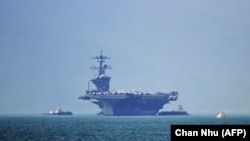
The US military has announced a second aircraft carrier group will deploy to the Middle East to respond to regional threats to stability as US forces continue to hit Iran-linked Huthi fighters in Yemen from its ships in the Red Sea.
Pentagon spokesman Sean Parnell said in a statement on April 1 that the aircraft carrier Carl Vinson will join the aircraft carrier Harry S. Truman in the Middle East "to continue promoting regional stability, deter aggression, and protect the free flow of commerce in the region."
The Carl Vinson has been ordered to arrive from the Indo-Pacific following completion of a scheduled exercise, Parnell said without saying when it would get there.
The announcement comes as US forces hit Huthi fighters in Yemen with near-daily air strikes in a campaign aimed at ending the threat they pose to civilian shipping and military vessels in the region.
"The United States and its partners remain committed to regional security in the CENTCOM AOR (area of responsibility) and are prepared to respond to any state or non-state actor seeking to broaden or escalate conflict in the region," Parnell said. CENTCOM is the US military command responsible for the region.
Parnell added that Secretary of Defense Pete Hegseth continues to make clear that “should Iran or its proxies threaten American personnel and interests in the region, the United States will take decisive action to defend our people.”
The Huthis, which the United States has designated as a terrorist group, began targeting shipping in the Red Sea and Gulf of Aden after the start of the Gaza war in 2023, claiming solidarity with Palestinians.
Huthi attacks have prevented ships from passing through the Suez Canal, forcing many companies to send their goods on a costly detour around the tip of southern Africa that takes considerably longer.
President Donald Trump vowed on March 31 that strikes on the Huthis will continue until they are no longer a threat to shipping.
"The choice for the Huthis is clear: Stop shooting at US ships, and we will stop shooting at you. Otherwise, we have only just begun, and the real pain is yet to come, for both the Huthis and their sponsors in Iran," Trump said on his Truth Social platform.
Trump added that the Huthis had been "decimated" by "relentless" strikes since large-scale air strikes began on March 15, saying that US forces "hit them every day and night -- Harder and harder."
The large-scale air strikes began after Trump warned the Huthis that "hell will rain down upon you" if they did not stop their extremist actions, including missile launches against Israel.
Trump has also said that "there will be bombing" if Iran does not reach a deal on its nuclear program.
Huthi officials said at least 12 civilians were killed and another nine injured in the US attacks, but the claims could not be independently confirmed. The officials vowed revenge without specifying how it would carry it out.
Secretary of State Marco Rubio on March 16 said the attacks were “a message to Iran” to stop supporting the Huthis, and Hegseth said Iran "is on notice" that Huthi attacks on American ships, aircraft, and troops will not be tolerated.
With reporting by AFP
Iran Vows Strong Response After 'Bombing' Threat By Trump
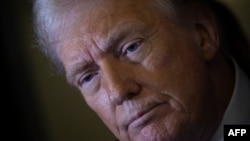
Iranian Supreme Leader Ayatollah Ali Khamenei warned of a "strong" response following a threat by US President Donald Trump that "there will be bombing" if Tehran doesn't agree to talks on its nuclear program as concern grows over escalating rhetoric between the two countries.
Speaking after Trump reiterated his threat of adopting measures ranging from fresh sanctions and tariffs to military action, Khamenei said in a sermon marking Eid Al-Fitr on March 31 that any attack by the United States would "surely receive a strong reciprocal blow."
The Iranian leader, however, added that he did "not really expect mischief from abroad."
The comment suggests Khamenei does not expect an attack but rather sabotage operations like explosions and assassinations, said Damon Golriz, a lecturer at The Hague University of Applied Sciences.
"He's effectively pointing the finger at Israel here," Golriz told Radio Farda, adding that Trump's remark on Iran and US officials talking was "important."
Switzerland's ambassador to Iran, who represents US interests and acts as an intermediary between Washington and Tehran, was summoned on March 31 by Iran's Foreign Ministry to express the regime's determination to respond "decisively and immediately" to any US threat.
Since Trump returned to the White House, his administration has consistently said Iran must be prevented from acquiring nuclear weapons and has previously warned that military action is on the table should Iran reject Trump's outreach.
Iran has long maintained that its program is for peaceful use, but Iranian officials have also threatened to pursue a weapon as tensions amid a growing standoff with the United States over sanctions and renewed bombing in the Gaza Strip following the collapse of a cease-fire in Israel's war against Iran-backed Hamas, which is deemed a terrorist organization by the United States and the EU.
Trump again threatened Iran in an interview with NBC News on March 30 just days after Tehran rejected holding direct talks with Washington over its rapidly expanding nuclear program.
While high-ranking Iranian officials had previously spoken against the idea of holding nuclear talks with the United States, Iranian President Masoud Pezeshkian said specifically on March 30 that Tehran would not enter direct negotiations with Washington, though it is willing to continue talks indirectly in line with an injunction from Khamenei.
"If they don't make a deal, there will be bombing," Trump said in the NBC interview by phone.
"There's a chance that if they don't make a deal, that I will do secondary tariffs on them like I did four years ago," he added.
But Trump also said US and Iranian officials are "talking," without offering details.
Mohammed Ghaedi, a lecturer at George Washington University's department of political science, told Radio Farda that Trump was "saber-rattling" and "exercising brinksmanship."
"I think it highly unlikely that Trump will bomb Iran, not least because he vowed on the presidential campaign trail not to drag the United States into a war," he told Radio Farda.
The latest trading of threats was preceded by a round of diplomacy that failed to bring the sides any closer.
An Emirati delegation delivered a letter to Tehran from Trump proposing nuclear talks with the United States earlier this month, but hours before it arrived Khamenei had already dismissed the prospect of talks with the Trump administration.
The letter gave Tehran a two-month window to decide on holding talks.
Similar comments were made by Iranian Foreign Minister Abbas Araqchi on March 27 when he said Tehran had sent a formal written response to Trump via Oman that maintained Iran will not hold direct negotiations as long as Trump's "maximum pressure" campaign is in effect.
A report in February by the UN's nuclear watchdog said Iran has accelerated its production of near weapons-grade uranium.
Iran's economy has been reeling from years of sanctions, particularly after Trump in his first term pulled the United States out of a landmark nuclear deal with Iran and reimposed sanctions.
Tehran is looking to find ways to ease those sanctions or have them removed entirely, but the public rejection of Trump's letter could lead to new pressure from Washington and other powers who are worried about Iran's nuclear program.
With the 2015 nuclear deal set to formally expire in October 2025, world powers that are still part of the pact have just a few months before they lose the ability to reimpose UN sanctions on Iran.
With reporting by RFE/RL's Kian Sharifi, AP, Reuters, and AFP
Iran's President Publicly Rejects Trump's Letter Calling For Nuclear Negotiations
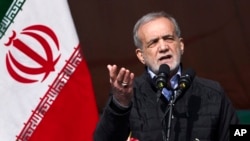
Iranian President Masud Pezeshkian publicly rejected holding direct negotiations with Washington over its rapidly expanding nuclear program, which had been proposed in a letter from US President Donald Trump and delivered to Tehran earlier this month.
“Although the possibility of direct negotiations between the two sides has been rejected in this response, it has been emphasized that the path for indirect negotiations remains open,” Pezeshkian said in televised remarks on March 30, referring to Trump’s letter.
While high-ranking Iranian officials had previously spoken against the idea of holding nuclear talks with the United States, Pezeshkian’s comments mark Iran’s first formal rejection of the US call for negotiations.
Since Trump returned to the White House, his administration has consistently said that Iran must be prevented from acquiring nuclear weapons and they have previously warned that military action is on the table should Iran reject Trump’s outreach.
Pezeshkian’s remarks now help set the stage for a further rise in tensions between Tehran and Washington over the country’s nuclear program.
Iran has long maintained that its program is for peaceful use, but Iranian officials have also threatened to pursue a weapon as tensions amid a growing standoff with the United States over sanctions and renewed bombing in the Gaza Strip following the collapse of a cease-fire in Israel’s war against Iran-backed Hamas, which is deemed a terrorist organization by the United States and the EU.
A report in February by the UN’s nuclear watchdog said that Iran has accelerated its production of near weapons-grade uranium.
An Emirati delegation delivered a letter to Tehran from Trump proposing nuclear talks with the United States earlier this month, but hours before it arrived Iranian Supreme Leader Ayatollah Ali Khamenei had already dismissed the prospect of talks with the Trump administration.
Similar comments were made by Iranian Foreign Minister Abbas Araqchi on March 27 when he said that Tehran had sent a formal written response to Trump via Oman which maintained that Iran will not hold direct negotiations as long as Trump’s “maximum pressure” campaign is in effect.
“This official response includes a letter in which our position regarding the current situation and Mr. Trump's letter has been fully explained to the other party,” Araqchi said.
In his televised comments, Pezeshkian offered the most direct acknowledgement yet that Tehran has rejected direct talks, although he left the door open for indirect negotiations with the United States and trust-building efforts.
“We don’t avoid talks; it’s the breach of promises that has caused issues for us so far,” Pezeshkian said. “They must prove that they can build trust,” he said, referring to the United States.
Iran’s economy has been reeling from years of sanctions, particularly after Trump, in his first term, pulled the United States out of a landmark nuclear deal with Iran and reimposed sanctions.
Tehran is looking to find ways to ease those sanctions or have them removed entirely, but the public rejection of Trump’s letter could lead to new pressure from Washington and other powers who are worried about Iran's nuclear program.
More sanctions could also be coming if Tehran doesn't reach an agreement.
With the 2015 nuclear deal set to formally expire in October 2025, world powers that are still part of the pact have only have a few months before they lose the ability to reimpose UN sanctions on Iran.
With reporting by the Associated Press
- By RFE/RL's Radio Farda and
- Kian Sharifi
Insisting On Indirect Talks, Iran Responds To Trump Letter Via Oman
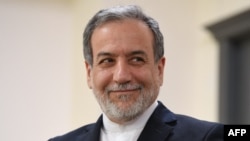
Iran said it has given a "restrained" response to a letter by US President Donald Trump proposing direct talks over a new nuclear deal, as Tehran continues to insist on indirect negotiations.
Foreign Minister Abbas Araqchi said on March 27 that Iran delivered its formal written response to Trump via Oman, maintaining that Tehran will not hold direct negotiations as long as Trump’s “maximum pressure” campaign is in effect.
"This official response includes a letter in which our position regarding the current situation and Mr. Trump's letter has been fully explained to the other party," Araqchi said.
Trump’s letter was delivered to Iran by an Emirati official on March 12. Some observers have argued that Iran’s decision to reply via Oman was due to concerns over the relationship between the United Arab Emirates and Israel.
Others, however, have pointed to Trump’s rapport with Israeli Prime Minister Benjamin Netanyahu, saying that Israel will be made aware of the contents of Iran’s letter by Washington.
Reports say Trump’s letter included a proposal for direct negotiations over Iran’s nuclear program and threats that failure to reach a deal would have severe consequences. Washington has not ruled out air strikes against Iran’s nuclear program.
Indirect Talks A No-Go
Ali Shamkhani, a top adviser to Iranian Supreme Leader Ayatollah Ali Khamenei, said Tehran’s response was “restrained.”
“It has been said in the letter that Iran is ready for indirect negotiations and if talks are held on equal footing, there is readiness to take further steps to negotiate,” said Shamkhani, a former national-security adviser.
Ali Vaez, Iran Program director at the International Crisis Group, says Tehran’s insistence on indirect talks will not go down well in Washington because Trump cares about the optics of face-to-face negotiations.
“Trump has no interest in indirect negotiations,” Vaez told RFE/RL’s Radio Farda. “Any indirect talks through mediators, no matter how good they progress, will be vulnerable.”
Hossein Mousavian, a former Iranian ambassador to Germany, wrote on X that he believes Iran delivered “an ambiguous response” and “addressed all the key points in Trump’s letter.”
Vaez, however, criticized Iran’s negotiation tactics, arguing that decision-makers in Tehran “have no understanding” of how Trump operates.
“You cannot be ambiguous with Trump and his representatives. This type of diplomacy doesn’t work with this administration,” he said, adding that Iran needs to table a clear proposal for direct talks.
“Iran’s approach is a waste of time, and in the worst-case scenario, it’ll bring us to a dead-end where you can no longer have a peaceful resolution,” Vaez said.
The Islamic republic insists its nuclear program is peaceful, but there have been growing calls among hard-liners to weaponize it.
Trump pulled the United States out of the 2015 nuclear deal with Iran during his first term in office, arguing that it did not go far enough to rein in Iran's threat, such as restricting its missile program and ending support for its regional proxies.
Iran says it is willing to talk to lift US sanctions, but it has categorically ruled out talks over the missile program and regional activities.
With reporting by Elaheh Ravanshad of RFE/RL's Radio Farda
- By Mehran Karimi and
- Kian Sharifi
Iranian Journalist Trades Microphone For Rifle To Defend Ukraine
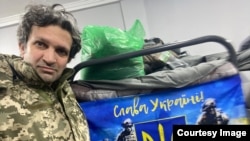
Kourosh Sehati was working for the UK-based Iran International TV station when Russia launched its full-scale invasion of Ukraine in 2022.
Now, the broadcast journalist aims to fight on the front lines in Ukraine, the Eastern European country he calls his “second home.”
Sehati is the first known Iranian to apply to join Ukraine’s Foreign Legion, a military unit of the armed forces composed of foreign volunteers. The Foreign Legion has not yet approved his application.
In an interview with RFE/RL’s Radio Farda, Sehati said he wanted to defend Ukraine against what he called “the club of dictators and invaders.”
That was a reference, he said, to Russian President Vladimir Putin and his key allies, including Iran’s clerical rulers, the Belarusian authoritarian leader Aleksandr Lukashenko, as well as North Korea and China.
The 46-year-old’s decision to fight in Ukraine was also deeply personal.
“I have an attachment to Ukraine because my wife is Ukrainian and our kids are half Ukrainian,” he told Radio Farda, adding that his family lives in London.
Sehati announced his decision to fight in Ukraine on March 18, writing on X that he had enlisted to “fight the criminal Putin and his backers.”
Russia 'Hurt' Iran
Beyond his personal ties to Ukraine, Sehati’s opposition to Moscow is rooted in Iran’s historical grievances against Russia.
“Russia has hurt Iran a lot over the last 200 years,” said Sehati, who worked for Voice of America’s Persian Service and holds US citizenship.
Persia and tsarist Russia fought a series of wars in the 19th century, culminating in Tehran ceding much of the Caucasus to Moscow.
The Russian Empire also vied for control of Iran’s natural resources and occupied Iranian territory.
In the mid-1940s, the Soviet Union supported short-lived ethnic Kurdish and Azeri republics in northwestern Iran. Although the republics were swiftly dismantled, they contributed to ethnic tensions that persist to this day.
Not All Iranians Support The Islamic Republic
Since the start of Russia’s war in Ukraine, Iran has supplied Moscow with drones that have been used to strike Ukrainian cities and infrastructure.
While both Tehran and Moscow deny it, there is substantial evidence suggesting otherwise. There are also growing concerns that Iran could provide Russia with missiles for use in Ukraine.
Sehati said one of his motivations for enlisting was to challenge perceptions about Iranians.
“I’m trying to send a message of solidarity between Iranians and Ukrainians so that Ukrainians don’t associate Iranians with the Islamic republic’s actions,” he said.
A rights activist who was arrested several times for his political activities, Sehati fled Iran to Turkey in 2004. He was granted the status of political refugee and later moved to the United States.
Not Murder, But Self-Defense
Sehati was 10 when the Iran-Iraq War ended in 1988 and has no prior combat experience beyond the two-year mandatory military service he completed in Iran.
Sehati said he is looking forward to receiving "professional training" and admitted he has never killed anyone in battle. But he is mentally prepared.
“It’s like when someone breaks into your home with a weapon and tries to attack you. What do you do?” Sehati said. “Defending yourself is legitimate self-defense, not murder.”
CORRECTION: An earlier version of this story incorrectly stated that Kourosh Sehati was on the frontlines and receiving professional training. Sehati has confirmed that he has not been deployed and has not yet received any training. According to a statement from the press service of the International Legion of Defense of Ukraine, his application to join the force has not yet been approved.
- By Margot Buff and
- Austin Malloy
Iran Shows Off Military Might In Footage Of 'Underground Missile City'
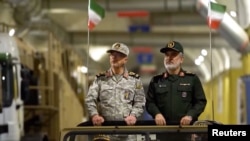
Iran has released video showing a massive underground missile facility filled with a cache of high-powered weaponry.
The footage, shared by Iranian state media on March 25, showed Iranian Armed Forces Chief of Staff General Mohammad Baqeri and Amir Ali Hajizadeh, the Islamic Revolutionary Guards Corps Aerospace Force commander, showing off what Iranian media said was an "underground missile city."
Some of Iran’s most advanced weapons are seen mounted on vehicles parked in the underground tunnels.
The release of the video comes at a moment of high tensions between Iran and the United States.
Farzan Sabet, a researcher specializing in nuclear nonproliferation and Middle East politics at the Geneva Graduate Institute, said the Islamic republic has made similar displays of its military strength in the past.
“During times of tension, they'll find various ways to signal their offensive military power, their defensive military power, and their deterrence capabilities. And so, one of the things they do, for example, is test missiles or carry out military exercises,” Sabet told RFE/RL. “One of the other things they do is to tour military facilities, and among those are missile facilities.”
On March 15, the United States launched large-scale air strikes on Yemen targeting the Iran-backed, US-designated terrorist group Ansarullah, better known as the Huthis.
Some defense observers consider the strikes to be intended in part as a warning to Iran.
Meanwhile, Iranian hard-liners have renewed a push for the development of nuclear weapons in the new Iranian year, which started on March 20.
US Director of National Intelligence Tulsi Gabbard said on March 25 that Iran is not building a nuclear weapon. But she noted that US intelligence agencies are monitoring Iran’s nuclear activities closely.
Iran Unveils 'Underground Missile City' Amid Regional Tensions
Iran's military officials toured a massive underground missile facility filled with a cache of high powered weaponry. The footage, shared on March 25, showed Iranian Armed Forces Chief of Staff General Mohammad Baqeri and Amir Ali Hajizadeh, the Islamic Revolutionary Guards Corps Aerospace Force commander, showing off what Iranian media said was an "underground missile city." According to a defense researcher, Iran wants to signal its military strength to its rivals but is leaving the door open for deescalation.
- By Kian Sharifi
Iran Rings In Nowruz Amid Calls To Go Nuclear
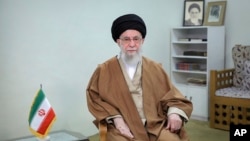
Welcome back to The Farda Briefing, an RFE/RL newsletter that tracks the key issues in Iran and explains why they matter.
I'm RFE/RL correspondent Kian Sharifi. In this edition I'm looking at how hard-liners are urging Iran’s decision-makers to green-light the development of nuclear weapons in the new Iranian year.
What You Need To Know
• Hard-liners Push For Nukes In New Year: Iranian hard-liners have renewed a push for the development of nuclear weapons in the new Iranian year, which started on March 20. As prospects of direct talks with the United States fade, they argue that only going nuclear can serve as a reliable deterrent to war.
• US Strikes To Degrade Houthis And Weaken Iran: Meanwhile, the United States has been launching wave after wave of air strikes against the Iran-backed, US-designated Yemeni terrorist group Ansarullah, better known as the Houthis. Analysts argue that the attacks are not only meant to restore freedom of navigation, but also serve as a warning to Iran.
• Authorities Step Up Crackdown On Female Singers: Iran has intensified its efforts to suppress female singers, detaining or summoning several women in recent weeks as part of a broader crackdown. Authorities have also targeted their online presence, shutting down Instagram accounts to further silence their voices. RFE/RL’s Radio Farda has the story.
The Big Issue
Have No Fear, Go Nuclear?
Sentiment to develop nuclear weapons has been growing in Iran in recent years, particularly among hard-liners who staunchly oppose engagement with the West.
The renewed calls come as Iran is weighing how to respond to a letter from US President Donald Trump on direct negotiations to reach a new deal over Iran’s nuclear program.
In a Nowruz appearance on state television, Iranian Foreign Minister Abbas Araqchi said on March 20 that the Islamic republic’s policy was to not have direct talks with the United States. He added that Iran is in “no rush” to respond to the letter, but will reply “in a few days.”
The letter, which Axios says includes a two-month deadline to reach a deal, is “mostly threats but also claims to have opportunities,” Araqchi said.
Why It Matters: Iran and Western powers are in a race against time. The 2015 nuclear deal, which has been effectively defunct since Trump withdrew the United States from it during his first term in office in 2018, expires this October.
In other words, the United States and its European allies only have until then to trigger the deal’s “snapback mechanism” to reimpose UN sanctions against Tehran. Without a new nuclear deal, the sanctions will, in all likelihood, return before October.
That could prompt Iran to weaponize its nuclear program, risking Israeli -- and possibly US -- air strikes on its nuclear facilities.
Last month, The New York Times reported that Iran was exploring the possibility of building a crude nuclear weapon to ward off an attack, but experts argue Western intelligence would still be able to detect it in time to launch an attack.
Curiously, there are those in Iran who prefer a limited attack on nuclear facilities to giving into US demands. They argue that, if the Islamic republic survives an attack on its nuclear sites, it would be worth the trade-off.
What's Being Said: Going for shock and awe, the hardline Vatan-e Emrooz newspaper’s yearend front page displayed a large picture of a mushroom cloud with a headline simply reading, “Nuclear Year.”
The paper alleged that, because the United States “cannot be trusted,” the world at large is moving toward nuclear weapons.
Nezamoddin Mousavi, a hard-line commentator, argued that, despite being militarily well-equipped, Japan during World War II lacked nuclear weapons.
“Japan had everything except for an atomic bomb, which America did have!” he wrote on X.
Nour News, which is affiliated with former national-security adviser Ali Shamkhani, hinted that Iran might withdraw from the Nuclear Non-Proliferation Treaty if Washington and its allies “make good on their threats.”
Expert Opinion: “The chances for an Israeli-American attack on Iran’s nuclear facilities this summer just went up pretty significantly,” Nadav Pollak, a lecturer at the Tel Aviv-based Reichman University, wrote on March 19.
That's all from me for now.
Until next time,
Kian Sharifi
If you enjoyed this briefing and don't want to miss the next edition, subscribe here. It will be sent to your inbox every Friday.
- By RFE/RL
2 Men Convicted In New York For Plotting To Kill Iranian Dissident Journalist

Two men identified by prosecutors as members of the Russian mob have been convicted in New York City for plotting to kill Iranian-American journalist and activist Masih Alinejad in a murder-for-hire scheme financed by Iran's government.
The verdict was returned on March 20, ending a two-week trial that included testimony about how Iran targeted Alinejad, 48, for her online campaigns encouraging Iranian women to defy Iran’s law requiring women to cover their hair in public.
Prosecutors said Iranian intelligence officials first plotted in 2020 and 2021 to kidnap Alinejad and move her to Iran to silence her criticism of the government. When that failed, Iran offered $500,000 for her to be killed, prosecutors said.
Assistant US Attorney Michael Lockard told the jury on March 19 that the “Iranian government” had set the award to “fund the plan to silence” Alinejad.
Alinejad called the verdict “a powerful gift from the American government” to the people of Iran because it shows that justice is beginning to be served.
“I am relieved that after nearly three years, the men who plotted to kill me have been found guilty. But make no mistake, the real masterminds of this crime are still in power in Iran,” she told The Associated Press. “Right now, I am bombarded with emotions. I have cried. I have laughed. I have even danced.”
Leslie R. Backschies, who heads the FBI's New York office, said the verdicts show that the “Iranian government's shameless conduct and attempt to violate our laws and assassinate a critic of their human rights atrocities will not be tolerated.”
Prosecutors said the convicted men, Rafat Amirov and Polad Omarov, were members of the Russian mob. Defense lawyers argued at trial that their clients were innocent and evidence was flawed.
“We respect the jury's verdict, but plan on filing an appeal on Mr. Omarov's behalf,” Elena Fast, an attorney for Omarov, was quoted by the AP as saying in an e-mail. A lawyer for Amirov did not immediately respond to the AP’s request for comment on the verdict.
In court on March 19 his lawyer, Michael Martin, said there was no doubt "Iran targeted Alinejad, but his client was not part of any plot."
Alinejad testified last week that she came to the United States in 2009 after she was banned from covering Iran's disputed presidential election and after the newspaper where she worked was shut down.
After establishing herself in New York City, she built an online audience of millions and launched a campaign that told Iranian women to send photos and videos of themselves exposing their hair when the morality police were not around.
She ultimately inspired women to take to the streets in Iran on Wednesdays to peacefully protest, leading the government to arrest hundreds of women. The crackdown only caused her following to grow.
Prosecutors said that by 2022, the Iranian government enlisted organized crime figures to kill Alinejad.
Khalid Mehdiyev, a former member of the Russian mob, testified that he was hired as the hitman.
Mehdiyev, who cooperated with prosecutors after pleading guilty to multiple crimes, said he bought an AK-47 to kill Alinejad in July 2022, but the plan was foiled when his car was stopped by police and the gun was found. Mehdiyev, like Amirov and Omarov, are citizens of Azerbaijan.
American officials have accused Iran of backing several assassination plots in the United States, including one against President Donald Trump during his presidential campaign last year.
In a separate case, US prosecutors in 2022 charged a man in Iran's Islamic Revolutionary Guards Corps (IRGC) with plotting to kill former US national-security adviser John Bolton. Tehran has denied being behind any such plots.
The plots came after Iranian officials vowed to exact revenge against Trump and others over the 2020 drone strike that killed prominent IRGC General Qassem Soleimani.
With reporting by AP
Editors' Picks
RFE/RL has been declared an "undesirable organization" by the Russian government.
If you are in Russia or the Russia-controlled parts of Ukraine and hold a Russian passport or are a stateless person residing permanently in Russia or the Russia-controlled parts of Ukraine, please note that you could face fines or imprisonment for sharing, liking, commenting on, or saving our content, or for contacting us.
To find out more, click here.

































